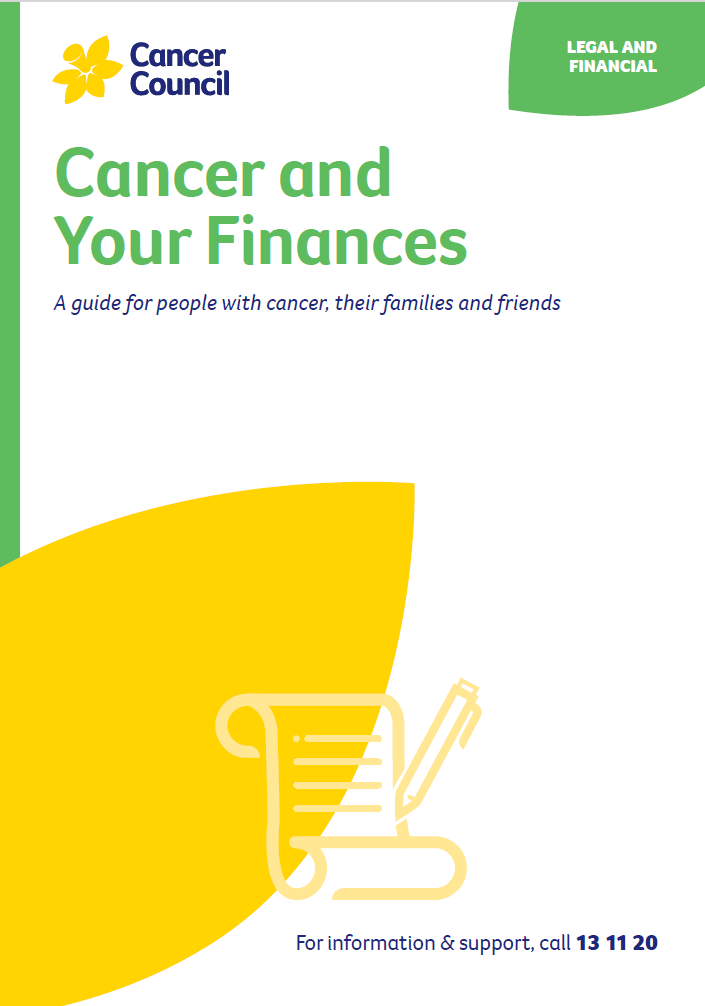- Home
- About Cancer
- Living well
- Living well after cancer
- Practical concerns
Practical concerns
After cancer treatment, you may have concerns about financial issues, insurance policies and work.
Learn more about:
- Financial support
- Legal services
- Insurance
- Working after treatment ends
- Watch videos: Managing the cost of cancer
Financial support
For many people, cancer treatment can be a financial strain. This could be caused by extra costs you may have during and after treatment, or loss of income.
Financial support and advice is available:
- Call your local Cancer Council on 13 11 20 to find out what support services are available. Depending on where you live, Cancer Council may be able to provide financial counselling support (if you are struggling with debts and everyday expenses) or refer you to a financial planner (for advice on income and asset management).
- Call the National Debt Helpline on 1800 007 007 for free, confidential and independent financial counselling.
- Ask your social worker if any financial or practical assistance is available to you. If you have to travel for follow-up appointments, ask about patient travel assistance.
- Ask your utility company, loan provider or local council how they can help you manage payment of your bills (e.g. electricity, water, gas, internet, phone bills), loans or rates. Check if you qualify for any rebates, concessions or hardship programs.
- Ask your superannuation fund if you are eligible for early access to your super or any attached insurance policies. Talk to a financial counsellor or planner about how this will affect your long-term financial situation.
Learn more about cancer and your finances and download a fact sheet on Superannuation and cancer.
I called Cancer Council and ended up speaking to a financial counsellor. She helped me sort things out with the bank.
Vincent
Legal services
Depending on where you live and your financial situation, Cancer Council may be able to connect you with a lawyer for free advice about legal issues that may arise as a result of cancer. Call 13 11 20 to find out more. You can also contact Community Legal Centres Australia or The Law Society of NSW.
Insurance
Applying for new insurance (life, income protection or travel) may be harder because you have had cancer. You are generally required to provide your medical history, including any diagnosis of cancer.
In general, you should be able to buy insurance for things that are not cancer-related (like travel insurance for lost luggage or life insurance for accidental death).
It may be difficult to buy travel insurance that covers medical problems that are related to cancer, but you should be able to get coverage for non-cancer-related medical costs. It is a good idea to check exactly what is covered before buying a new insurance policy.
If you need legal advice about an insurance policy, you can contact the Insurance Law Service at the Financial Rights Legal Centre. Call 1300 663 464 or visit financialrights.org.au.
Download our Insurance and cancer fact sheet.
→ READ MORE: Working after treatment ends
Video: The cost of cancer
Understanding the costs of cancer treatment is crucial for planning ahead. From medical expenses to practical costs like travel and childcare, know what to expect and how to navigate financial decisions.
Video: Centrelink payments
Discover the financial support options available if you need to stop working due to illness. Learn about Centrelink payments, healthcare cards, and resources from the Cancer Council to help manage your financial situation.
Video: Debts and everyday expenses
Struggling with debt or bills? Learn how to manage your finances and get support from a financial counsellor. Watch now for practical tips and resources.
More resources
Prof Michael Jefford, Medical Oncologist and Director, Australian Cancer Survivorship Centre, Peter MacCallum Cancer Centre, VIC (clinical review); Lucy Bailey, Nurse Counsellor, Cancer Council Queensland; Philip Bullas, Consumer; Dr Kate Gunn, Clinical Psychologist and Senior Research Fellow, Department of Rural Health, University of South Australia, SA; Rosemerry Hodgkin, 13 11 20 Consultant, Cancer Council WA; Prof David Joske, Clinical Haematologist, Sir Charles Gairdner Hospital and Clinical Professor of Medicine, The University of Western Australia, WA; Kim Kerin-Ayres, Clinical Nurse Consultant, Cancer Survivorship, Concord Hospital, NSW; Sally Littlewood, Physiotherapist, Seymour Health, VIC; Georgina Lohse, Social Worker, GV Health, VIC; Melanie Moore, Exercise Physiologist and Clinical Supervisor, University of Canberra Cancer Wellness Clinic, ACT; June Savva, Senior Clinician Dietitian, Nutrition and Dietetics, Monash Cancer Centre, Monash Health, VIC; Dr Elysia Thornton-Benko, Specialist General Practitioner and Research Fellow, University of New South Wales, NSW; Prof Janette Vardy, Medical Oncologist, Concord Cancer Centre and Professor of Cancer Medicine, The University of Sydney, NSW; Lyndell Wills, Consumer.
View the Cancer Council NSW editorial policy.
View all publications or call 13 11 20 for free printed copies.

